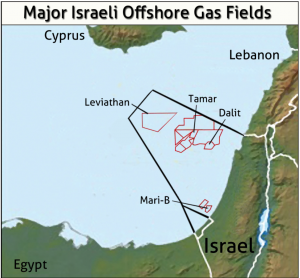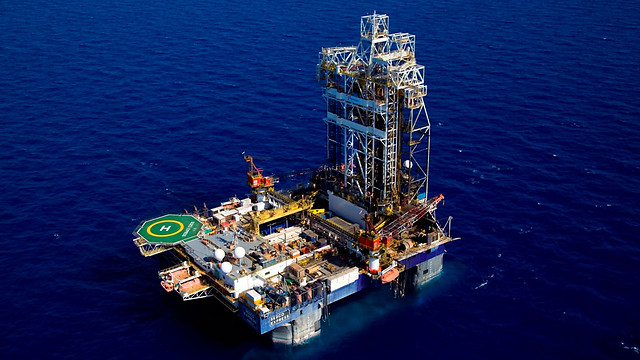
Israel’s PM Netanyahu, who is also Minister of Economy, signs deal after months of contention, that’s meant to regulate the energy market in Israel.
• Energy Minister Steinitz adds, ‘The people of Israel will get 60% of the profit, a higher percent of the natural gas profits, than most western countries get.’
By Amir Alon
Prime Minister Benjamin Netanyahu, who is also the minister of economy, signed on Thursday the natural gas deal with US and Israeli gas companies to develop Israel’s offshore gas deposits, despite months of protest by liberal MKs and environmentalists.

Prime Minister Benjamin Netanyahu signing gas deal – Photo: Haim Horenstein
Ahead of the signing, Netanyahu asserted that “there is no way to open up the additional gas fields without this plan, it is the only chance.”
“This gas was given to us as a gift from God. It makes us, potentially, if not an energy superpower then definitely an important international force. This plan is important to our economy because it gives us a relatively cheap source of energy,” Netanyahu continued.
“It’s also important for our foreign relations. Many countries have expressed interest. Not just Greece and Cyprus, whose leaders I’m going to meet in a few weeks. Jordan, and of course the Palestinian Authority as well, are interested. Turkey and Egypt are also interested, and we’re discussing this with them.”
The prime minister said he decided to sign the gas deal despite the objections of the Knesset’s Finance Committee. “Unfortunately, this has turned into a political and populist discussion. I’ve read (the committee’s opinion), considered it, and decided to approve the gas plan today. This plan is vital to our security, because we don’t want to be left with one power plant that’s under fire, we want multiple gas fields.”
Energy Minister Yuval Steinitz said: “After years of unnecessary and harmful delays, after six months of a great struggle to put an end to the foolishness with which the largest gas field, Leviathan, has been left uselessly at the bottom of the sea – we are here.
“This is something we’ve been handling since the government before last at the Sheshinski Committee and later with legislation at the Knesset. The people of Israel will get a higher percent of the profit than the average in most western countries: About 60 percent of the profit,” Steinitz added.

The Leviathan gas field – Photo: Albatross
Israel announced the discovery of sizeable offshore natural gas deposits about five years ago, and a partnership made up of Israeli and US companies began extracting gas.
After the antitrust commissioner determined last year that the gas companies’ ownership constituted a monopoly, a government committee reached a deal with the firms to break up their control and introduce competition.
Netanyahu received the Economy Ministry and the authority to sign the deal after a series of resignations and moves that removed all of the deal’s opponents from the way. Anti-trust commissioner David Gilo opposed the deal and resigned even before the plan was completed. Then-economy minister Aryeh Deri, who was asked to sign a clause bypassing the anti-regulator’s authority, refused and resigned as well, leaving the Economy Ministry back in the prime minister’s hands.
Critics of the plan claim it will only perpetuate both the monopoly that exists in the market and the control of a foreign corporation on Israel’s energy market for years to come. Critics also say the plan will also lead to very steep prices, the result of the lack of competition.
Opposition leader Isaac Herzog (Zionist Union) said in response: “The signing of the gas deal through Clause 52 is a worthless act done in the name of Israel’s security. This is a cynical exploitation of (Israel’s) security needs to serve interests that do not benefit the Israeli public. The Zionist Union will petition the High Court of Justice in the near future in order to stop this twisted move anf protect Israel’s economy, and to restore to the Israeli public its rights”
Critics of the deal stated that the “day the anti-trust commissioner was bypassed will go down in shame as the day the Prime Minister and Minister of Economy Netanyahu blatantly violated the law. This step frees the gas monopoly tycoons from the obligation to stand trial for their offenses committed regarding the antitrust law. The struggle will continue with more stregnth on all fronts: legal, public and in the streets.”
Israel’s Delek and Texas-based Noble Energy, which own a number of recently discovered gas fields that supply factories and Israel’s electric company, will continue to own Israel’s largest natural gas field, Leviathan, said Energy and Infrastructure Minister Yuval Steinitz at a press conference on Tuesday.
Leviathan, with estimated reserves of 22 trillion cubic feet (tcf), will take about 3-1/2 years to develop and is expected to supply billions of dollars of gas to Egypt and Jordan in addition to supplying Israel.
However, Delek – through its units Delek Drilling and Avner Oil Exploration – will have six years to sell its entire 31.3 percent stake in a second large field, Tamar, and Noble will have to trim its stake in Tamar to 25 percent from 36 percent.
The companies will also be forced to sell two smaller fields, Tanin and Karish, within 14 months.
Tamar, with reserves of about 10 tcf, began production in 2013 to supply the domestic market and is due to be expanded for export. Tanin and Karish hold a combined 3 tcf.
The government will set a price ceiling and the deal will remain unchanged for 10 years.
On the issue of gas prices, Steinitz said when presenting the plan in June that the price of gas exports has been limited twice – both an internal limitation within the market, so the average forecasted price in Israel will be at the price ceiling of 5.5 dollars per unit, and the export price of the natural gas will not be cheaper than the domestic price.
“There is no price control, instead there are price limitations,” Steinitz explained. “We are establishing a price ceiling for the next few years, and an additional element which ensures that domestic prices will always be lower than export prices.”
Reuters and AP contributed to this report.
View original Ynet publication at:
http://www.ynetnews.com/articles/0,7340,L-4740650,00.html






 Israeli New Shekel Exchange Rate
Israeli New Shekel Exchange Rate